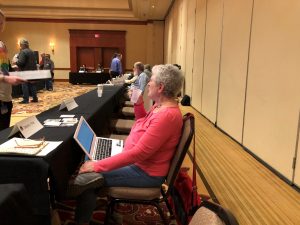I’m a bit late because things are suddenly very busy. I also have no time to write anything new. Let me give you something old…
This was first published on 11 December 2011 BiblioBuffet. I wrote for BiblioBuffet for 3 years, once a fortnight, and it was such a joy. You can still find all the pieces on the Wayback Machine.
One of the recurring tasks of the Medievalist who does other things (like write here, or teach, or write fiction, or even go to dinner parties) is to deal with the popular idiocies that abound about the Middle Ages. Flat earths, rotten food, chastity belts: popular ideas that have little or no grounding in actual history sometimes appear unending.
A little while ago, I reviewed a book about classical science. This book (unintentionally) reinforced one of those odd views about the Middle Ages. It assumed that there wasn’t much in the way of scientific progress or scientists during the period. James Hannam read my review and emailed me, suggesting I read his book on Medieval science, God’s Philosophers. How the Medieval World Laid the Foundations of Modern Science,which addresses precisely this issue. He kindly sent me a copy and he was right ‑ I needed to read his book. If you have an interest in what actually happened in science in the Middle Ages then you might also need to read his book. I don’t agree with all of it, but I’m very glad it exists.
The writer’s choice of form is shaped by the nature of their caring about history. Hannam cares passionately about science in the Middle Ages and he faced some of the same dilemmas as I do concerning popular misconceptions. This is why he wrote what he wrote.
In his introduction, Hannam lists many of the less-intelligent things, of the kind I listed in my first paragraph those I gave above, that I’ve found people think about Medieval science. His list gave me an immediate sense of not being alone. Hannam points to sources such as Richard of Wallingford and Thomas Aquinas and quotes Voltaire and others deriding the darkness of the mind in the Middle Ages. Through these quotations he demonstrates, passionately, where our rather negative view of Medieval science comes from. I shall refer to this introduction in class next time the subject comes up, because Hannam has all too obviously encountered the same sets of attitudes I have. He looks at those attitudes, and deals with them succinctly and clearly.
His views are not mine. They exclude women’s science, for instance, and I would have liked a better coverage of the science behind the spanking new technologies of the time, of distillations and spirits and advanced optics and more. I would especially have liked a close look at how the different religions of Europe combined to achieve major cultural transformation.
Hannam’s book is a popular history. It targets some widely-held misunderstandings about the Middle Ages and the role of the era in modern science. It carries its own burden of understanding, however. What do I mean by ‘burden of understanding’? We all interpret the world around us. We all carry a whole raft of material we use to help us in this interpretation, from assumptions right through to careful analysis. Hannam’s material is carried by his passion for the Middle Ages and the shape of his understanding of the Middle Ages. His Middle Ages isn’t mine: it is, however, still powerful.
These interpretations are linked to the form we choose to write in, the subjects we choose to write about and the approach we take to these subjects. Hannam chose popular history. There are other choices.
Not so long ago I looked at a scholarly writer whose passion led him into the life of Benedetto Blanis. The result was a book, Jews and Magic in Medici Florence: The Secret World of Benedetto Blanis, that was written from an expert (academic) vantage point but that is accessible to the wider public. It contains fascinating insights into Jewish life in Medici Florence. Because Edward Goldberg’s passion was more scholarly, the overview of Blanis’ life and times was not enough. His new book, A Jew at the Medici Court. The Letters of Benedetto Blanis Hebreo (1615-1621), contains the letters of Benedetto Blanis. Unlike the first book, this is not really for the wider public. It’s a critical edition of the letters, with English summaries and rather good notes. Unlike the popular book, we can see directly into Blanis’ life.
The wonder of a good scholarly edition is that the notes and the index and the scholarly apparatus (I am in love with the phrase ‘scholarly apparatus’) serve as tools to help the reader see something more clearly. In this case, it’s Benedetto Blanis and his world.
It’s a terrific companion volume to the first book and the summaries of the letters give the key information in each (which is good for readers who have insufficient Italian). Goldberg’s passion for the past is expressed through his wish for us to see Blanis and understand his life, and he gives us all the tools we need. The letters themselves are the pure magic. Goldberg was clever to realise this and facilitate the transit between them and the reader.
They’re a door opening to give us a peek into something amazing. Opening the volume at random, I read that Blanis has received his patron’s last letter. He’s extremely polite to his patron ‑ his language is full of courteous superlatives. He uses phrases like “deo gratia” ‑ this shows to me that the Christian and Jewish communities had common language. And all of this is to ask if he can send a package of clothing and some silk to Venice under Don Giovanni’s seal. It makes me think that the patronage relationship can be like that of a child at boarding school towards the family back home. “Send money.” Send food.” “Can I do this, please?”
A good history will give you a considered overview. A good critical edition of primary sources allows you to think differently and explore byways. here, the focus changes according to the life of the letter writer, not the thesis of the modern author ‑ this means that letters can throw up the most extraordinary bits of information. At this point I should give you an interesting tidbit to lure you into yearning after the book. Three times have I opened this volume to find something and three times I’ve found myself absorbed in the stuff of Blanis’ life, when he was trying to make a living, when he was trying to get out of prison, when he was describing a suicide, when he was carefully manoeuvring around politics that were bigger than he was. It’s an addictive, fascinating book.
In this instance, the first book illuminates the second ‑ Goldberg’s passion for history has given us a pair of volumes that work marvellously together.
A third book that’s led first and foremost by the writer’s passion for the (historical) subject is different again. It’s fiction, for one thing. Suzy Witten, in The Afflicted Girls shows her passion for communicating the horrid events of Salem in 1692.
This kind of book is harder for the historian to evaluate. I can read the letters presented by Goldberg and I can analyse Hannam’s approach to science, but the measure of success for history in a novel is how much the reader cares. And the historian as a reader of historical fiction or fantasy is a very difficult reader indeed. It’s not that I don’t read historical fiction: it’s that I’m a fussy audience for historical fiction.
Witten has been dutiful in her research, and it shows in the fine detail that colours the novel. What is missing for me is that (especially near the beginning) the fine detail is uncoloured by emotion. I don’t know whether to be impressed or disgusted at the Porter family’s “roll-top bright painted calash.” It’s not something that I know from my own frame of reference and Witten doesn’t always give enough information for me to interpret it within the frame of reference of the novel. It must be important, for the description occurs at the beginning of a chapter, but I don’t know the way in which it’s important. Is it presumptuous of the Porter family to paint in bright colours, or is it an entirely everyday thing? Are they rich, or struggling poor? Without any knowledge of how much it costs to buy and run a calash, I don’t know where it fits in the society of the novel. This means that, while the society of the novel is full of detail, I don’t always have the tools to assess that detail and Witten herself doesn’t always give me the tools. I can see Witten’s passion for the past and for brining readers the lives of this town at this time, and I hurt when they hurt (for it’s a strong narrative) but I do it from the vantage point of the present. It’s a distant viewing, not a close one. When Witten brings us close in (as she does on the very next page, when we learn that the use of a Boston dressmaker has social and emotional consequences) the past is far more alive.
By the time we reach the harrowing events of the witch trials, the past is more fully alive and the novel is powerful. Still, it’s interesting that Witten carries with her the baggage of description. Its excessive detail is her way into understanding what the past looks like and feels like. It’s her way of carefully documenting it. Documenting, however, works best in a book such as Hannam’s and fine documentation of detail works best of all in a book such as Goldberg’s. In a novel, that documentation works better when it has an emotive aspect. It is a path into the past for the reader and it’s important that this path show us how the specifics of the place and time were viewed.
Telling detail is, in fact, the reader’s link to the normative past, the typical day. Those small bits of information concerning daily life show how that normal everyday moment is seen by those who live in the world of the novel. When this small world all falls apart, we then have a frame of reference from which we can understand the emotional depths. This link between the apparently trivial and the narrative is something that’s much more difficult for nonfiction to achieve. It can bring us into the past and make us feel for the history of individual and to cry for the loss of their lives.
All three of these books-the popular history, the letters, the historical novel, carry us into the past. They use different methods and have different reasons for the journey, but they are how we, as readers, begin to understand the people who have gone before.
Books mentioned in this column:
A Jew at the Medici Court. The Letters of Benedetto Blanis Hebreo (1615-1621) by Edward Goldberg (University of Toronto Press, 2011) 9781442643833
Jews and Magic in Medici Florence: The Secret World of Benedetto Blanis by Edward L. Goldberg (University of Toronto Press, 2011) 9781442613331
God’s Philosophers. How the Medieval World Laid the Foundations of Modern Science by James Hannam (Icon Books, 2009) 9781848311503
The Afflicted Girls. A Novel of Salem. By Suzy Witten (Dreamwand, 2009) 97800615323138

 Somewhere fairly recently I was in a conversation with someone (can you tell I cannot for the life of me remember when, or with whom, the conversation occurred?) about the why of writing. The person I was talking with spoke pretty definitively about why writers write, and while her points (I can remember it was a woman I was speaking with, maybe by the time I finish this post I’ll remember her name) were valid, I thought they were also limited. As if she could not imagine reasons to write that were not hers. Which is the crux of why I write. I’m trying to figure out why people do what they do. It’s why I read, too: to understand.
Somewhere fairly recently I was in a conversation with someone (can you tell I cannot for the life of me remember when, or with whom, the conversation occurred?) about the why of writing. The person I was talking with spoke pretty definitively about why writers write, and while her points (I can remember it was a woman I was speaking with, maybe by the time I finish this post I’ll remember her name) were valid, I thought they were also limited. As if she could not imagine reasons to write that were not hers. Which is the crux of why I write. I’m trying to figure out why people do what they do. It’s why I read, too: to understand.
 It’s been several years since I’ve gathered with fans and other writers in person. I used to attend local science fiction conventions regularly, but the last one was FogCon (Walnut Creek CA) in February 2020. I find it amusing that my last haircut was in March 2020, although one is not necessarily causative of the other. I attended book signings at local stores and gave presentations at our local branch library. I also organized a monthly lunch and support group with a group of local writers. Needless to say, all these came to a screeching halt with the pandemic, and while some have ventured into in-person conventions, I have not done that yet. I’m in my mid-70s, which in itself increases my risk of serious disease or death, but I feel strongly that no one should ever feel pressured to defend wearing a mask or justify staying away from indoor gatherings. (In my case, there’s the personal risk, plus that my younger daughter spent the final year of her medical residency in Family Medicine taking care of desperately ill and dying Covid patients — this was before vaccines were available — and she is fiercely protective of me.)
It’s been several years since I’ve gathered with fans and other writers in person. I used to attend local science fiction conventions regularly, but the last one was FogCon (Walnut Creek CA) in February 2020. I find it amusing that my last haircut was in March 2020, although one is not necessarily causative of the other. I attended book signings at local stores and gave presentations at our local branch library. I also organized a monthly lunch and support group with a group of local writers. Needless to say, all these came to a screeching halt with the pandemic, and while some have ventured into in-person conventions, I have not done that yet. I’m in my mid-70s, which in itself increases my risk of serious disease or death, but I feel strongly that no one should ever feel pressured to defend wearing a mask or justify staying away from indoor gatherings. (In my case, there’s the personal risk, plus that my younger daughter spent the final year of her medical residency in Family Medicine taking care of desperately ill and dying Covid patients — this was before vaccines were available — and she is fiercely protective of me.)